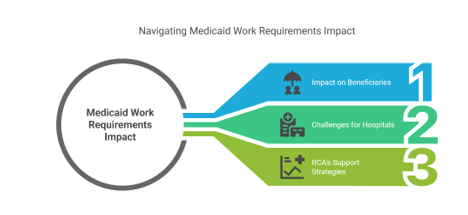
As we approach the release of the federal budget and its potential impact, the healthcare community is closely monitoring ongoing discussions about Medicaid work requirements, a central feature of the budget plan. These requirements, aimed at finding significant savings, particularly within the Medicaid program, are being pushed forward as part of a broader effort to reduce federal spending. However, the impact of these changes may have unintended consequences for hospitals and the patients they serve, potentially increasing the number of uninsured individuals and placing additional financial pressure on healthcare providers.
At RCA, with over 30 years of experience in the healthcare industry, we understand the complexities of this evolving landscape. Our mission has always been to help hospitals navigate the challenges of reimbursement and patient care, and this new shift is no different. Here’s a breakdown of the situation, and how RCA is positioned to help healthcare providers adjust.
What’s Being Proposed?
The proposed Medicaid work requirements primarily affect “able-bodied” adults who qualify for Medicaid under the expanded program in 41 states. The House aims to implement these requirements to encourage employment and reduce government spending, hoping to save $880 billion. Proponents argue that work requirements promote dignity, self-sufficiency, and the opportunity for individuals to contribute to the economy. However, evidence suggests that these measures might not achieve their intended results.
The Potential Impact on Medicaid Beneficiaries
Research has shown that work requirements in Medicaid programs have led to coverage loss without tangible increases in employment. For example, in Arkansas, a 2018 program resulted in over 18,000 individuals losing their Medicaid coverage, yet there was no significant improvement in employment rates. A key issue is that many Medicaid recipients are already employed, and a large portion of those who aren’t working face barriers like illness, disability, or caregiving responsibilities.
As work requirements are rolled out, it’s estimated that the policy could lead to a loss of coverage for around 600,000 individuals, despite projected federal savings of $109 billion over ten years. These numbers are concerning for hospitals, especially as increased uninsured patient populations place additional strain on healthcare systems that are already grappling with rising costs and administrative hurdles.
Administrative and Financial Challenges for Hospitals
One of the major issues hospitals will face as these changes are implemented is the administrative burden. States like Arkansas and Georgia have already spent millions on the infrastructure needed to enforce Medicaid work requirements, including costly reporting and compliance systems. For hospitals, this means more resources will be needed to verify patients’ Medicaid eligibility, manage self-pay patients, and deal with an influx of individuals who may lose coverage or face barriers to maintaining it.
Additionally, hospitals may see reductions in their Disproportionate Share Hospital (DSH) funding, which is crucial for facilities serving high numbers of low-income patients. As more individuals fall off the Medicaid rolls, hospitals will be left to absorb the financial impact of treating uninsured individuals, which could lead to tighter margins and increased bad debt.
How RCA Can be a GO-TO Resource
Given the challenges that lie ahead, RCA is ready to help hospitals navigate this transition with our 30+ years of industry expertise. Here’s how we can support healthcare providers during this difficult period:
- Enhanced Eligibility Verification: RCA can help hospitals streamline eligibility verification processes, ensuring that patients who are eligible for Medicaid are properly enrolled and able to maintain coverage. By implementing efficient workflows, hospitals can reduce administrative costs and avoid unnecessary denials.
- Patient Financial Assistance Programs: With more patients potentially losing coverage, hospitals will need robust financial assistance programs. RCA’s expertise in self-pay accounts and assistance programs can help ensure that patients are properly screened for charity care, state programs, and other forms of financial support. This will help mitigate the impact of rising uninsured rates.
- DSH Funding Optimization: As hospitals face the possibility of losing DSH funding, RCA can assist in optimizing Medicaid Days associated with DSH qualifications. We’ll ensure hospitals meet all the necessary requirements to retain the maximum amount of funding possible, even as the rules around eligibility tighten.
- Compliance and Reporting Support: RCA is well-versed in compliance regulations and can provide support to hospitals in navigating the complexities of reporting and maintaining Medicaid eligibility. With more reporting requirements likely to come, our solutions can help ensure that hospitals remain in compliance and avoid costly penalties or coverage losses.
- Proactive Strategy Consultation: As the Medicaid landscape evolves, hospitals will need to stay ahead of policy changes. RCA offers consulting services to help facilities strategize and plan for the future, ensuring that they are prepared for the shifting dynamics of Medicaid, insurance, and patient care.
Looking Ahead: The Role of RCA in a Changing Healthcare System
As work requirements are debated and likely implemented, the healthcare system will need to adapt. While the goal of encouraging employment is a noble one, the reality is that many Medicaid recipients face significant challenges beyond employment. Hospitals will be left to pick up the pieces, caring for patients who are no longer covered or who struggle with access to care.
At RCA, we are committed to helping healthcare providers navigate these complexities. We understand that the landscape is shifting, and our goal is to ease that transition for both hospitals and the patients they serve. With our long-standing industry knowledge and proven solutions, we can help ensure that hospitals continue to provide high-quality care while managing the financial and administrative impacts of these new policies.
Together, we can face these challenges and continue to advocate for policies that better serve the needs of patients, healthcare providers, and the broader community. Stay tuned for further updates, as we will continue to monitor these discussions and provide insights as new developments arise.

Leave A Comment
You must be logged in to post a comment.